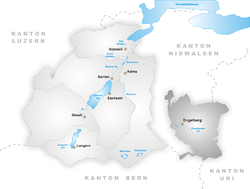Engelberg Abbey
| Engelberg Abbey | |||||
| Kloster Engelberg | |||||
| Imperial Abbey of the Holy Roman Empire | |||||
| |||||
|
| |||||
 | |||||
| Capital | Engelberg Abbey | ||||
| Government | Theocracy | ||||
| Historical era | Middle Ages | ||||
| - | Founded | 1120 | |||
| - | Gained immediacy under the Holy See |
1124 | |||
| - | Gained jurisdiction over local villages |
1236 | |||
| - | Swiss Congregation created | 1602 | |||
| - | Annexed by Helv. Rep. | 1798 | |||
Engelberg Abbey (German: Kloster Engelberg) is a Benedictine monastery in Engelberg, Canton of Obwalden, Switzerland. It was formerly in the Diocese of Constance, but now in the Diocese of Chur. It is dedicated to Our Lady of the Angels and occupies a commanding position at the head of the Nidwalden valley.
History

Founded in 1120 by Blessed Conrad, Count of Seldenburen, with the first abbot being Blessed Adelhelm, a monk of St. Blaise's Abbey in the Black Forest, under whom the founder himself received the habit and ended his days there as a monk. Numerous and extensive rights and privileges were granted to the new monastery by various popes and emperors, amongst the earliest being Pope Callistus II, in 1124, and the Emperor Henry IV. The abbey was placed under the immediate jurisdiction of the Holy See, which condition continued until the formation of the Swiss Congregation in 1602, when Engelberg united with the other monasteries of Switzerland and became subject to a president and general chapter.
In spiritual matters the abbots of Engelberg exercised quasi-episcopal jurisdiction over all their vassals and dependents, including the town which sprang up around the walls of the abbey, and also enjoyed the right of collation to all the parishes of the Canton. In temporal matters they had supreme and absolute authority over a large territory, embracing one hundred and fifteen towns and villages, which were incorporated under the abbatial rule by a Bull of Pope Gregory IX in 1236. These and other rights they enjoyed until the French Revolution, in 1798, when most of them were taken away. The prominent position in Switzerland which the abbey occupied for so many centuries was seriously threatened by the religious and political disturbances of the Reformation period, especially by the rapid spread of the teachings of Zwingli, and for a time its privileges suffered some curtailment.
The troubles and vicissitudes, however, through which it passed, were happily brought to an end by the wise rule of Abbot Benedict Sigrist in the 17th century, who is justly called the restorer of his monastery. Alienated possessions and rights were recovered by him and the good work he began was continued by his successors, under whom monastic discipline and learning have flourished with renewed vigour. The library, which is said to have contained over twenty thousand volumes and two hundred choice manuscripts, was unfortunately pillaged by the French in 1798. Ironically, in the spirit of learning and preservation of knowledge, the library contains to this day a complete set of the writings of Martin Luther. The abbey buildings were almost entirely destroyed by fire in 1729 but were rebuilt in a substantial, if not very beautiful, style and so remain to the present day.
In 1873 a colony from Engelberg founded Conception Abbey, at Conception, Missouri in the United States; in 1882, Mount Angel Abbey was founded near what is now Mount Angel, Oregon, also in the United States.
William Wordsworth wrote a poem about the abbey entitled "Engelberg, The Hill of Angels"
Educational institutions of the monastery
Since 1851, there exists the Boarding School of the Abbey Engelberg, which was first performed by a secular rector since 2009. 2001, the Academia Engelberg Foundation was founded.
References and external links
| Wikimedia Commons has media related to Engelberg Abbey. |
- Engelberg Abbey in German, French and Italian in the online Historical Dictionary of Switzerland.
- Abbey Engelberg (German)
- Boarding School of the Abbey Engelberg (German)
- Engelberg, The Hill of Angels
- Engleberg Abbey Chapel (JPEG image)
- Mount Angel Abbey (JPEG image), a daughter abbey to Engelberg
- Images of the grounds of the Abbey
![]() This article incorporates text from a publication now in the public domain: Herbermann, Charles, ed. (1913). Catholic Encyclopedia. Robert Appleton Company.
This article incorporates text from a publication now in the public domain: Herbermann, Charles, ed. (1913). Catholic Encyclopedia. Robert Appleton Company.
